#and i never saw it and i never intended to! so!!! epic
Explore tagged Tumblr posts
Text
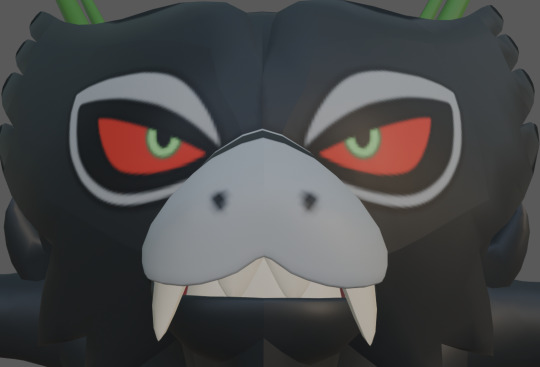
#zarude#i remember posting about this thing when it was revealed. one of the most confusing pokémon reveals of all time but i guess#they've done this kind of thing before? with like. zeraora? and other movie pokémon like. meloetta or something maybe. celebi#but i feel like this pokémon came out and then Everyone immediately stopped talking about it. and the movie it was in#and i never saw it and i never intended to! so!!! epic
76 notes
·
View notes
Note
AITA for letting a friend think my husband is cheating on me? A few months ago, my husband (30s) told me (also 30s) he has an adultery kink, but has no interest in actually cheating on me. His proposed compromise was that I could dress up a little different than usual, put on a wig, whatever, and then we could roleplay. A little weird, but I MUCH prefer him communicating stuff like this and working with me rather than the alternative. plus, i get to invent a character and give this fictitious homewrecker a tragic backstory; always fun. I'm thinking about giving her an epic revenge quest to explain her daddy issues. Anyway, I genuinely do like dressing up and I bought the wig anyway, so sometimes I go out in public dressed up as my Homewreckersona, and the long and short of it is a friend saw me with my husband, did not recognize me, and assumed the worst. The next day she called me up like "honey have you considered killing him" and I didn't know what to say. I can't just say "oh, I'm indulging my husband's kink in public." I cannot explain how much I do not want to talk about our sex life with anyone who actually knows me irl. I have to look these people in the eye. Also, she's the type who would tell me his kink is inherently abusive or something and I think it's ultimately harmless if this is how he's playing it. My married life, my choice, right? But anyway, I lied and tried to be like "oh her? yeah I know her. they've been friends for years and there's nothing weird going on. they're like siblings so don't even worry about it because he's not cheating I promise" and for sure she didn't believe me. So in effect, by lying, I have accidentally convinced a gossipy member of my friend group that my husband is cheating on me and I'm clueless about it. If five more people haven't been served the nonexistent tea by Friday, I'll eat my hat. AITA for letting him take the fall on this one just so I can avoid the excruciating embarrassment of admitting to kink stuff? PS: for anyone convinced he really does want to cheat, I tested him a little when he first brought it up and asked if there was any particular look he wanted me to go for (just to see if there might be a specific person he wanted to cheat with who I was intended to emulate) and he said no, whatever I picked would be great, because for all that he had the kink conceptually, he'd never actually wanted anyone but me. I know I'm biased but that's the cutest shit
513 notes
·
View notes
Text
That Time Again
A/N: Just a little (well it was intended to be little, but, oh well) drabble here because I can't help but think how Din, spending most of his adult life alone when not with the covert, and not knowing much about a woman's cycle, would be embarrassed when he accidentally thinks she's injured and feels bad for embarrassing her too. I think after the initial awkwardness, he'd be such a sweetheart about it ���️
Warnings: Fluff, mention of periods.
Word Count: 1,333
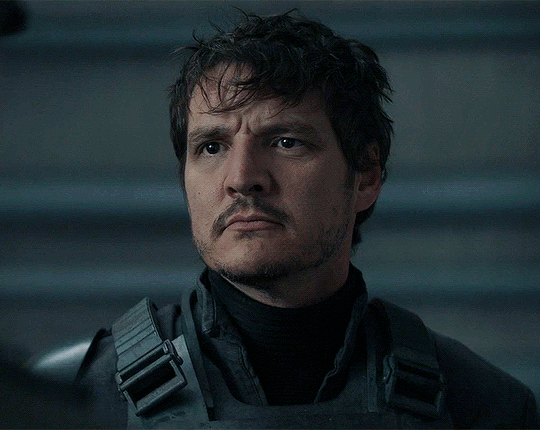
The hunt didn't exactly go to plan, screw that, it was an epic failure! You and Din had just managed to get away by the skin of your teeth! You'd never been so relieved as when you saw the Razor Crest come into view, Din lowering the ramp by his vambrace. Once safely inside, with the ramp secure, you slump back into the cold steel wall, enjoying the icy chill seeping through your top into your sweaty skin as you catch your breath. "Well that didn't go well," Din panted as he leaned against the opposite wall.
"No shit," You shake your head through a half chuckle, half moan, "So what's the plan, now?" With his breathing finally under control Din stands tall, every bit the confident Mandalorian, even when he's not trying to be. It just naturally oozes from him. "He's scared and desperate now. He knows we're after him, so he'll keep running. I just didn't expect him to have so many men protecting him. But I'll get him, don't worry about that." Raising an eyebrow, you counter, "You mean we'll get him." "No!" came Din's curt and authoritative relpy, "It's too dangerous for you now."
"Din...," you begin protesting but he continues. "I've been doing this a long time, so trust me when I say I have to do this alone. This one just got much more complicated. I can't focus on the target and protect you at the same time. We're lucky we got out in one piece." Reluctantly you agree, but can't help but feel butterflies in your belly at Din's protectiveness of you. It's at times like this that you think, maybe he does feel the same way.
Locking that thought away you push off of the wall and begin to walk away when you hear a modulated gasp and feel Din's gloved hands grip your shoulders, stopping you in your place. "What the-," "You're hurt!" Din's voice quavers as panic grips his chest. You turn your head, utterly confused, trying to see where he's looking. What the hell? He's looking at ...my arse? "What? I'm not hurt. what are you talk-," Oh shit! Your eyes widen and your cheeks burn red as you realise what has happened.
You spin around, slowly backing away, trying your best not to stammer, but failing miserably. "Its n... not what you... you think. I'm... I'm fine." Din straightens, surprised by your weird response. "You're not fine, your bleeding. Let me-," "No!" He stops at your raised voice. "I'll take care of it. Trust me it's nothing." "It's not nothing." Now Din is raising his voice, clearly frustrated which in turn is making things worse.
Maker can't he just let it go? Can the universe do you a favour and open a black hole to swallow you now? He's really going to make you say it, isn't he? "Why won't you just let me help?" Din's asks exasperatedly, walking closer to you as you back away. "Cause it's nothing!' you insist, your stomach in knots. "Stop saying that!" Din blusterd. You drop your head into your hands, pressing the heels into your eyes, embarrassment burning through every inch of you. "For makers sake, Din! It's my period, okay. I've bled through!"
Silence follows your outburst, causing you to look back up at Din, who's stood stock still, if you didn't know any better, you'd think he was a statue. "Oh...," he mumbled, awkwardly. "Yeah... 'oh'," you scoffed. "I... I'm sorry... I didn't mean-," "It's okay," you blurted, right now not knowing what was redder, the blood on your trousers of the blood in your cheeks, "I'm just... gonna... go," you pointed over your shoulder to the fresher. As you shower, you realised that you'd been so eager to escape that situation that you'd forgotten to bring clean clothes with you. "Aw, shit," you grumble to yourself. Well, hopefully he'll be in the cockpit.
You open the fresher door, peaking around carefully. You've already had one embarrassing moment today, you don't need another. To your relief, you're alone. You sigh and look down, and that's when you see the neatly folded pile of clean clothes on the floor, right in front of the door. You smile as you pick them up, taking them with you into the fresher to change. Once you're clean and presentable, you head up to the cockpit, knowing you can't avoid each other on such a small ship. So you'll have to, as they say, suck it up. But when you open the door, your met with an empty room.
"Din?" no answer. "Din?" you shout louder, but still, no answer. That's odd. He never leaves without telling you. Maybe he's just as embarrassed as you? Maybe he can't face you right now? Before you can dwell on it any longer, you hear the ramp lowering. You slide down the ladder to the hull to see Din walking up the ramp with a brown paper bag in hand. He stops a couple of feet in front of you, the atmosphere clearly awkward.
"I'm sorry I snapped at you, Din-," you begin, desperate to dissipate the discomfort between you both. "Please don't apologise," Din lifts a hand to stop you, "I'm sorry. I didn't realise.... if I'd known, I wouldn't have...," Din clears his throat and slowly holds the bag out for you to take. "What's this?" you smile as you take the bag and look inside. Your heart melts at the sight. Inside, there are sanitary towels, tampons, a moon cup, heat up gel packs, pain relief and even a big bar of chocolate.
You feel like crying. Kriff, this man is so sweet and so kind. Could he be any more perfect? If you hadn't already fallen in love with him, you would have now. "Din...," his name leaves your mouth in a whisper, while holding in the tears. You look into his visor, hoping you're making eye contact. "You didn't have to do this. Thank you! This is... so sweet of you." "I wanted to help," he replied, softly. "I didn't mean to embarrass you earlier," he added after a moment. "It's okay," you shrug, feeling the embarrassment melt away by the second. "I think we were both a bit embarrassed."
"Yeah," Din chuckles, his shoulders losing some of the tension in them. He still feels bad about the situation, but seeing your eyes light up at his gift means the world to him, just as you do. Damn it, if only he could tell you how much he loves you. He's fearless in every aspect of his life, except when it comes to you. "Look, I don't claim to know much about 'this'," he emphasizes, "but I want you to know you don't ever have to feel awkward about it around me. We're a team, and if there's anything you ever need or anything I can do to help at this time, you can always come to me, okay?"
Your eyes soften even more and you're sure you're looking at Din like he'd hung the stars right now, but you don't care. You want him to know how much you appreciate his kindness and scincerity. "Thank you, Din. That means a lot." You can't help the beaming smile on your face right now. "You know...," you begin, teasingly, "for somebody who says he doesn't know much about 'this', you sure knew what products to look for."
"Well, I might have asked the lady working in the store if she could help me pick out the best things," Din confessed, in a playful tone. "And this?..." you wave the chocolate in front of his helmet, grinning like a fool. Din shrugged and you just knew he was grinning under his helmet too. "She also said some women have cravings, so I thought, best be prepared." "We're sharing this," you tap the bar against his breast-plate. Din chuckled, shaking his head in amusement, "Whatever you say, Cyar'ika."

#pedro pascal#din x reader#pedro pascal fandom#din djarin fanfiction#mando x you#pedro pascal fanfiction#the mandalorian fanfiction#din djarin x female reader#din djarin x reader#mando#din djarin fluff#pedro pascal characters#din djarin x you#din djarin x f!reader#star wars fanfiction#star wars#tooth rotting fluff
112 notes
·
View notes
Text
King and Prince 30
Part 29
Steve wasted no time appearing in town to challenge Jason. Eddie accompanied him, keeping a low profile as the horse he rode on again. Steve dismounted when they got to the butcher’s shop and Jason came out immediately as if summoned. He probably just saw them through the window the moment they arrived.
“Well look who decided to grace us low folk with his presence.” Jason’s apron was bloody and he was wiping it off his hands also.
Steve’s expression was stony. “Did I ever make you feel low? Even when we were alone?”, he asked.
“I always knew there was something off about you. That alone was enough.” Jason tossed the red stained cloth over his shoulder. “Why are you here?”
“I want you to rescind your blasphemous lies. I am no longer an agent of my homeland. I didn’t come here intending to invade this kingdom.”
People began to gather, first because of the brilliantly black horse, so rich and fine, then because of Steve who was equally fine. Folks began to murmur, speculating that this was the man who had their king so enamored. Jason was good at both gauging a crowd and turning them to his favor. And he saw opportunity.
“What happens if I refuse? I haven’t been shown any proof to the contrary.” Then he projected his voice. “Will you smite me? Or will His Majesty? If I’m wrong, reveal it to be evident. But if I am simply silenced, everyone here will know your true face.”
Steve’s frown deepened. “Will you not seek a more honorable path?”
“And what, pray tell, is the more honorable path?”, Jason questioned as his parents stepped out, curious about the wealthy looking man on their porch.
“I challenge you, Jason Carver, to a duel”, Steve said.
Jason smirked. Something about it reminded Steve of a predator. But he stood strong. The best man would win and that was him. Jason held out his hand, smears of blood still on it.
“I accept.”
Steve held his own hand out and shook it. But then Jason didn’t let go on the downswing as the crowd’s whispers began to rise. Steve tried to pull his hand back but Jason held firm. He took too many steps forward until he was in Steve’s space.
“You’re going to regret this.” He was grinning still until the horse whinnied and pushed his head threateningly between Steve and Jason, causing Jason to rear back.
“Easy, easy, I’m fine”, Steve soothed, petting the horse’s snout. He continued to shush them as he got on its back. “A messenger will be forthcoming with the details.”
----------------
The duel was set for a week’s time and in the following days, Eddie unfortunately saw Steve less and less. It wasn’t for lack of trying too. When he heard that Steve was taking on knights in the training room, he had come right over, gift in hand. They were gloves for his lovely hands so that he would never need to touch the likes of Carver ever again.
But before he could even enter, Dustin barred him, hand in his face.
“You can’t come in”, Dustin said.
“And why on this green, verdant earth, not?” He wasn’t in the mood for whatever Henderson was playing at.
“Steve told us he can’t be distracted while he trains.”
“I wouldn’t be a distraction”, Eddie argued.
“He specifically said, ‘if Eddie comes, don’t let him in’”, Dustin echoed.
“Mhm, but since when do you listen to whatever people tell you to do?”, Eddie challenged.
“Steve promised to show me a disemboweling move if I did”, Dustin said. “You got something to top that?”
Eddie highly doubted Steve was going to follow through with that promise, so he wasn’t going to one-up him just to satisfy Dustin. If Steve wanted to focus on the duel, he would respect that. The door opened and Lucas stuck his head out, allowing Eddie to hear the ruckus going on just beyond it.
“Dustin! Get back here! It’s so epic!”
There were cheers at least a dozen strong that supported Lucas’ claim and Dustin rushed to get back in and shut the door behind him, leaving Eddie all alone. He sighed, forlorn, before picking himself up. If Steve was throwing himself into this, so would he. It had been some time since he had to make a show of power to his people.
Eddie coordinated the dueling venue, erecting an arena in a dusty, flat area. During fall and winter, it was a congregation for demobeasts as it got cold and hard. During the warmer parts of the year though, it was either empty or frequented by youngsters playing their own games. By the week’s end, there was a view box for the king and his entourage, benches for the other spectators, and a ring in which the fighters would battle.
It wasn’t just people from the town immediately outside the castle that came. Word traveled fast and people from neighboring cities came as well. When dawn arrived of the duel, Eddie wondered if there would be proper accommodations. In the form of a raven, he flew over the duel grounds and saw that while the morning mist was still evaporating, people were already gathering to claim their spots.
That all suited him just fine, he decided. He would be announcing his courtship officially and the more ears the better.
The sun rose higher and the time was nearly here. Eddie had behaved and not distracted him at all, but he couldn’t resist coming into his tent as he prepared.
“Did you-did you cut your hair?”, Eddie nearly squeaked as an attendant tied leather to Steve’s shin.
“I do that sometimes for the summer”, Steve said, sitting on a stool. It wasn’t much of a change to be honest but it still drove home how Eddie hadn’t seen Steve in days. Just a couple inches off his hair felt like an immeasurable distance.
“You look as dashing as ever”, Eddie said easily, taking steps forward then realized they weren’t alone. “You may take your leave”, he ordered.
The attendant left, closing the tent behind themselves. There was a crowd ebbing and flowing outside but they were in their own little world now. Not a servant or chaperone to be spoke of. Eddie knelt down before Steve and finished the job, tying up his other leg. Steve was suddenly very conscious of his own breathing, of the way Eddie’s eyes focused on the task before him, of the tip of his nose, of the way his hands lingered.
In order to tie down the protective layer, he had to touch his calf, the back of his knee, his ankle. His clothing stood between skin to skin contact, but that didn’t stop the touch from warming him. It was the reverent way Eddie did it. It was having a king on his knees. It was Eddie adding something to protect him.
“In case you were wondering, this is why I couldn’t have you watch me train”, Steve said, his voice just ever so slightly breathless.
Just to be cheeky, Eddie kissed his clothed knee. “I heard you put on quite the performance.”
Steve moved to stand and Eddie helped him to his feet. Their only point of contact was their hands and yet it felt like so much. Not for the first time, Steve was trying to remember why he wasn’t allowed to kiss Eddie right now. He wanted to. Eddie wanted to. And Eddie seemed to have the same realization as his eyes met Steve’s. He brought the prince’s hand towards him to kiss the tips of his fingers, then the palm of his hand.
Eddie’s lips ghosted over the inside of his wrist when a blast of fanfare broke the illusion of privacy. But there was a moment still, where they both considered stealing just one more second to act on their desires. But then Eddie pulled away.
“Our public awaits”, he said, starting towards the tent’s opening.
Steve walked out with him, but they had to part ways so that Steve could enter the arena and that Eddie could go to his viewing box and announce the start of the duel, as well as lay out the terms to all in attendance.
“Enjoy the show”, Steve said with a wink.
Part 31
Taglist CLOSED
@thesuninyaface @only-evanescent @snakeorsquid @ignoremyworld @theclichefortunecookie
@goodolefashionedloverboi @just-a-tiny-void @0body0disphoria0 @cinnamon-mushroomabomination @samsoble
@jamieweasley13 @y4r3luv @xtkxkrzrizir @un-knownperson @greekgeek24
@justdrugsformethanks @potato-of-the-lord @notaqueenakhaleesi @swimmingbirdrunningrock @queenie-ofthe-void
@nebulainajar @lil-gremlin-things @nicememerino @robininblue @hornedqueenofhell
@anne-bennett-cosplayer @moomkin77 @here4thetrama @bookworm0690 @autumncrocusandladybug
@lil-gremlin-things @littlebluejane @puppy-steve
85 notes
·
View notes
Text
Frustrating things people are getting wrong in the new Thunder saga in Epic the musical (spoilers for Thunder saga):
- Odysseus did have Eurylochus holding a torch when they passed through Scylla’s lair. He completely intended to kill him. The reason he lived is because he gave away his torch after he saw the men getting eaten.
- Eurylochus has every right to be mad. Not just because Odysseus had just shown that his crew was now disposable to him, but also because Odysseus literally just tried to KILL HIM.
- On the other side for Odysseus this was by far the safest option. The danger motif didn’t play once during Scylla because Odysseus was never in danger.
- Would a starving crew that just found out their captain was okay with letting them die just to get home mutiny? I think so, especially if he’s about to murder the second-in-command. Screaming “I won’t let you stand in my way” doesn’t look real good for you Odysseus.
- A bunch of people are saying that the crew was stupid for having killed the cows. Eurylochus was the one that killed one, and he tells Odysseus “you know we’re never making it home right”. He was prepared to die, he just wanted to die in comfort. Odysseus freaking out and trying to save them was probably a surprise for him.
- Was Odysseus right to sacrifice his crew? Debatable. His crew would have easily sacrificed him for their own lives. Odysseus had a whole arc on how he was a monster now, and how his family had become his sole motivation. Considering everything, it made complete sense for his character. Especially after the mutiny, since he now had his crew as an obstacle rather than a group he was leading.
-I’ve seen some things about how Odysseus was stupid for listening to the words of a siren for directions. In the original, Circe is the one who gives him directions, and the reason Scylla is the only option is because the other side of the route holds Charybdis. If they had gone that route him and his entire crew would have died. Circe was also the one who told him about the six torches, but I think in this one he is implied to have come up with it himself.
-People calling him stupid for listening to the siren also need to know that in the original, only his crew put beeswax in their ears. Odysseus had his crew tie him to the mast and then they basically watched him go crazy and try and get out of the ropes and into the water until they passed the sirens. Odysseus has always been this way, this is obviously why Athena chose him.
129 notes
·
View notes
Text
My introduction!
Hi! My name is Heather (they/them). I've been a lurker for some time, but I now realize what I've been writing has been whump all along, so.. hello!
My first encounters with whump were in Sunday school 😭😭 some of those kid's bible books were insanely whumpy for no reason at alI, and then it's only now I learn what the term actually is. I speak decent French (getting back into it after not using it for a few years), I intend to go to culinary school and become a professional chef, and my main fandoms include Overwatch, Baldur's Gate (not into it as much anymore, sadly), Epic: The Musical, and Ultrakill and FNAF (which I don't write much fic for).
This blog will never contain NSFW content! Kink blogs and antis please DNI!
What this blog will contain:
Whump (obviously)
My own writing (lots of drabbles, occasionally some of my more involved work ; aka my two big projects, a BBU story since that setting grabbed me by the brain as soon as I saw it for the first time, and various Overwatch characters getting whumped to hell and back --- I don't see enough talk about Cole Cassidy's big sad puppy dog eyes)
Lots and lots of reblogs since that's easier than actually writing 😅
Keep in mind that this isn't a NSFW blog and I won't be posting anything sexual/explicit, but I'm a fan of intense/graphic whump and things can get pretty dark. In those cases, there'll be a warning at the top of the post along with the content listings just to make sure everyone stays safe!
Some of my favorite tropes:
Living weapons!!
Gore (I'm not a fan of major character death, so I like it best when a healing factor is involved if it's very intense)
Parental caretakers
Transition/weight gain in recovery
Recovery in general, especially when difficult!
Lab whump!
Pet whump!
Chronic pain (totally not coping with this one)
Dehumanization!!
Vivisection!!
Panic attacks
Emotional distress of all kinds
Sickfics!!
If you send me any asks or requests or interact with my posts or say literally anything nice about me whatsoever I will give you my firstborn child
Some of my favorite whump blogs that inspired me to make a blog in the first place: @painonthebrain @whumpninja @defire @whumpwordsoftheday @sowhumpshaped
@sickfictropes @allthingswhumpyandangsty @writinglittlepains @whumpyourdamnpears --- sorry in advance if you didn't want to be mentioned! 😭
Btw --- check out my Widowmaker whump fic :)
Series:
Barbara Summers has a bad time with the mob (I'll update it someday I promise) ; also called "Consequences"
Intro
One
Two
Drabbles: (Electrocution+Unconscious+"Say Please") (Warm Bath + Fresh Bandages + "..Nothing. It just hurts") (Broken Fingers+Trying not to scream+"Aw, poor thing")
---
Crownchain
Character/setting introduction
"Foul Play"
"Pulling Strings"
Whump+Hurtcember: (Day 1: Collapse + Broken Bones) (Day 2: Breakdown + "This is your fault") (Day 3: Blood + Begging) (Day 4: "Help me" alt prompt + "This isn't my blood") (Day 5: Faint + Concussion) (Day 6: Touch Starved + "Please stop") (Day 7: Abandoned + Kidnapped) (Day 8: Cuddle + Fire alt prompt) (Day 9: Exhausted + Shaking) (Day 10: Touch Aversion + "Let me help you") (Day 11: "It's my fault" alt prompt + Manipulation) (Day 12: Cry + "I have nowhere else to go") (Day 13: Nightmare + Trauma) (Day 22: Self Harm + Hallucinations)
---
Hemopenia
Stages of blood withdrawal
Stage Zero
Pilot
Not Dead
Stage One
Lively
---
That's about it for now!! Thanks for reading!
42 notes
·
View notes
Text
I listened to the WBN Fireside on my way to work and there were two things Brennan said, one of which stood out to me as something I really agree with and one of which I really disagree with so I figured I'd make this post (the disagreement one) first and then the agreement one.
The latest episode of WBN had a scene that the characters were not present for nor viewing in any way. It was recorded without their knowledge, though they did listen to it when the episode came out, and on the Fireside Brennan said that such scenes should be used quite sparingly, given the nature of actual play, but (and I apologize, I haven't relistened and the transcripts aren't out) because the antagonists aren't present where the PCs are, it's useful at times to have a scene to keep them in the narrative for the audience.
I firmly disagree. I think that while it's true that actual play has a limited POV (if the characters don't see it, you don't see it), I have, in a lot of actual play fandom, never once seen a situation when it added to the story. Granted, WBN is ongoing, so I may eat my words here, but I am doubtful for a number of reasons.
Speaking as one small fraction of the audience, I am in possession of narrative object permanence. I do not in fact assume that when the PCs are in one part of the world, the rest of it grinds to a halt. In fact, something that skilled GMs do (including, frankly, Brennan himself most of the time) is quietly advance the plans of people who are offscreen. This is also not abnormal for the genre. Lord of the Rings has multiple POVs at different times, but never that of an antagonist; we learn of this through rumors, espionage, and Gandalf's retellings. Sprawling epics like A Song of Ice and Fire or the Stormlight Archives or the Wheel of Time make use of a wide range of third person limited viewpoints as well, not all aligned, but we don't see every move by every faction (and frankly, as a fan of that kind of book...I still think most of them could leave a bit more on the cutting room floor). Limited third person POV is not a weakness of Actual Play; I'd argue it is both a strength and a requirement. The story is driven by the player characters, and they cannot act on something they do not see.*
I'd also add that in this very specific situation, the audience saw the subject of the cutscene, The Man in Black, literally three episodes ago, which was a day ago in-game. He was brought up extensively in the discussion two episodes ago. If someone forgot? That's on them. We have not gone months and months without him making an appearance. I do think it's possible for villains to be poorly developed because they do not cross the paths of the characters enough (this is, as many of the people reading this likely know, a blog that loves to dunk on the cardboard-like nature of Otohan Thull's virtually nonexistent personality and motivations) but The Man in Black is sufficiently a banger of an antagonist as to not be so easily forgotten.
Finally, and this might just be me, but because I know how Actual Play and D&D work, I must admit the second I realized this was a no-PC cut scene I found it pretty hard to pay attention. In fact, it did the opposite of what was intended. Instead of eagerly awaiting news of how The Man in Black was waging war, filtered through whatever information Suvi, Eursulon, and Ame could obtain, I was zoning out while he talked. I think part of why I like Actual Play is that it usually leaves me, even with 4 hour episodes, wanting more. Cut scenes leave me wishing the cut scene hadn't happened.
*brief tangent: this doesn't, in my opinion, apply to the scenes in Downfall that the viewer sees but which weren't captured in the Occultus Thalamus. The story of Downfall is ultimately a story about the gods - they are the PCs - and the dramatic irony enhances the story-within-a-story aspect. It's important to the audience understanding of the gods to see the whole thing, and it's a valid choice that Bells Hells only see what occurred while the avatars were physically in Aeor. It does, however, apply to contemporaneous happenings in Worlds Beyond Number.
**This also doesn't apply to long DM monologues in the presence of players. The C3 solstice scene has been compared to a cut scene, but actually it's important that Bells Hells sees it. If one of the Wizard, Witch, or Wild One had managed to find a way to, even at a low level, scry or similarly learn of the Man in Black's doings? I wouldn't have minded it. I adore the Hakea vision scene. It's specifically that I'm in fact here to see what the characters see.
37 notes
·
View notes
Note
About Nightmare being a cult leader kind of figure, here's the thing:
Nightmare has absolute authority in the castle.
Everyone who joins him is made to change their name (none of them are called Sans anymore despite that being their actual name) (fun fact, you can absolutely read this as Something New Chara grooming Killer into a cult-like mentality way before Nightmare ever got there)
The castle itself is basically a cult compound. Only members of the cult are allowed in it, and they are not allowed to leave.
All the henchmen are cut off from their friends and families (Horror is the one who suffers from this the most, but Killer's AU also exists out there and is full of monsters, and Cross is highly discouraged from talking to Epic, Ink, or Dream).
Nightmare also has complete control over the finances of those under him, and I don't think we talk often enough about how fucked these guys are even if they ever escape because they have had no work experience for years and they have no money to help them get a new start. They're simply screwed.
Nightmare probably doesn't have the tightest grip on information control because Killer just knows stuff for no reason and that's very hard to avoid. However, by controlling Killer so thoroughly he does, at the very least, get to control what the other three learn. And he definitely has a way to spin things to make the Multiverse look even bleaker and more miserable than it is. And of making those under him feel as if they will never be accepted anywhere else. (After all, he doesn't have to make up the fact that they're wanted criminals, he just has to show them the fliers)
I don't think I even need to touch on emotional control with him. That's literally his hobby. And he's got quite a few tricks in his sleeve (direct soul tampering, emotional manipulation, tormenting his subjects with his shapeshifting, his negativity aura...).
Like, I don't think anyone intended for it, but the way Nightmare's gang is often portrayed is a cult. Of course, this can be pushed even further with Nightmare having them all practice thought-stopping techniques to keep them from having doubts, encouraging worship of him, breaking down his henchmen's boundaries, and capitalizing on their weaknesses. And none of those would feel out of place, but without them, this is still a cult setting. And these guys are gonna get fucked up in a uniquely cultish way
This reminds me of that post i saw before about how Dreamtale’s village was like a cult..looks like Nightmare really picked up a lot of tricks.
Especially the bit about killer already being groomed towards this mentality. He’d probably play the role of grooming the others too, honestly—either coming from a place of sadism or genuinely thinking he’s helping (for however much he cares to do so), them “learn” and survive.
And you’re definitely right about how all of them would be fucked if they tried to leave, and not just because of nightmare. Im honestly suprised killer even had the three people who were willing to try and help him. although the only one who seemed to have any consistent plan and approach was color.
Would be interesting if more people approached the gang from this angle.
{ @stellocchia }
#howlsasks#stellocchia#cw cults#utmv#sans au#sans aus#bad sans gang#bad sanses#nightmares gang#nightmare’s gang#nightmare sans#cross sans#killer sans#dust sans#horror sans#murder sans#murder!sans#dust!sans#killer!sans#nightmare!sans#cross!sans#horror!sans#horrortale sans#dustale sans#killertale sans#something new sans#xtale cross#dreamtale nightmare#undertale au#undertale aus
32 notes
·
View notes
Note
for da meme: how are you feeling post finishing RR and its incredible success? Also any pointers for writing good epics that stick the landing?
hi friend! thanks for the ask, hope you're doing well <3
i saw this ask and then had to walk away for a few days because it turns out that the answer is that i'm a little sad about being done with RR! it was an outrageously fun experience, both writing it and then getting to live vicariously through people reading it. i was thinking about this story near-constantly for 10 months. my top 5 songs from spotify wrapped are all from my RR playlist. now that it's over, there's a little hole in my days and my brain that used to be for RR work.
i'm so so so happy to have stuck the ending, as you say (never fucking again am i publishing a project as big as this one as i was writing it LOL, i was terrified of fucking up in realtime), and so honored that the story as a whole has resonated with the people who have read it. writing RR and joining the broader star trek fandom as a whole was an enormous part of my year and i'm so grateful for it. but i'm still a little sad that RR is over. like, what now?
anyway. onward!
i am so excited for your one man adventure novel. i can't wait to see what you get up to with it. the two pieces of advice that i kept in mind during writing are that: 1, knowing where you're going from the beginning is critical, but there's a balance between that and allowing things that you discover in the writing to influence where it goes. i had a college professor who insisted that we re-read what we had written before writing the conclusion of any paper, because the point you end up making is not always the one you intended to. (elise didn't exist in the first outline of RR!) 2, writer's block usually means you're no longer writing the story you want to be writing. the way around it is backtracking to the last point you were entirely sure you were exactly where you wanted to be and reevaluating what is bogging you down in the muck (shoutout maggie stiefvater's writing seminar for that one).
this is more process than anything but i live and die by outlines. i usually do three acts, two big arcs in each act, and then scene by scene notes. writing without an outline makes me feel like i'm stumbling into the future.
i hope this is at all helpful, and if you ever want to give me one man spoilers commiserate about longform fic in my discord dms you are always welcome :)
LLAP!!
#cicaklah#regulatory relations#asks#my writing#indy what are you writing next? bruh idk there's only candyfloss and oniongrass in my brain rn#gotta let them fields lie fallow for a minute before creating anything else
13 notes
·
View notes
Note
So apparently Captain (Agent 3) has a secret gig as an underground DJ called “DJ Sango” who is popular and did an epic rap battle with Marina. How would the Agents, Idols, Four and Acht react if they found out that Captain was secretly DJ Sango? And how would Captain react to them figuring out her big secret? (For an added bonus I’m gonna say that Acht admires her musical talent and has a celebrity crush on DJ Sango)

Okay I got really excited about this ask because I learned about the existence of the Low Water Party (the rave that DJ Sango and Marina’s DJ battle happened at) at few weeks ago and I have not stopped thinking about it since.
Pearl and Marina probably already knew about Captain’s secret, since Marina was the one doing the DJ battle with her, and Pearl was at the same rave doing a rap battle with Cuttlefish. I’m going to say Callie already knew as well since she also performed at the rave, along with Octavio (which is a piece of canon lore that I am freaking out over by the way). However Marie, Shiver, Frye, and Big Man had no idea about Captain’s DJ persona. Marie is surprised both to find out that Captain can DJ and the fact that Callie went to the rave where she DJed at and didn’t tell her. Shiver thinks it’s cool, but also insists on Deep Cut being invited to perform at the next Low Water Party. Frye only uses it as an excuse to tease Captain, seeing as now she may be a threat to Deep Cut’s music career. Big Man is really impressed that Captain not only knows how to DJ, but that they were able to keep it up for 8 hours in her battle with Marina.
Eight is just mad that he wasn’t informed of the fact that this rave had happened, since he would have loved to go. He insists on hearing Captain DJ the moment he finds out because he wants to hear how good she is. Neo just thinks it’s super cool. It wants to learn how to DJ from Captain, and constantly pesters them to teach it. Four loves it. They kind of tease Captain about her DJing career, but they’re also super impressed.
Acht definitely had a celebrity crush on DJ Sango before realizing she was Captain. They were at the Low Water Party as well, despite never appearing on stage and still being sanitized then. Though they didn’t really have emotion when they first saw DJ Sango, once they got into the Memverse and started thinking about it more was when their celebrity crush started. Four even supported it before learning DJ Sango is Captain. After finding out, Acht drops the celebrity crush because it’s gotten very very awkward.
Captain is horrified that they’ve all found out. She intended to keep her persona as DJ Sango a secret forever. She didn’t like that Pearl, Marina, and Callie knew, and now everyone does. Although she does enjoy the attention, even though she’d never admit it.
Thank you for the ask!!! I kinda wrote a lot… I got excited.
#captain 3#agent 3#agent 3 splatoon#pearl splatoon#marina splatoon#callie splatoon#marie splatoon#shiver hohojiro#frye onaga#big man splatoon#agent 8#neo agent 3#agent 4#acht splatoon#dedfour#acht x agent 4#asks#ask box
25 notes
·
View notes
Text
War of the Rohirrim thoughts:
Overall, I would say that I quite enjoyed stepping back into the world of LOTR (and it would be impossible for a single film to live up to the atmosphere of the original trilogy) it was a relief to see that, despite a few deviations/flaws, you can tell there was a lot of care and respect for the source material from those involved.
I only wish they provided more of a historical context as to the disparity or ongoing conflict between the Dunlendings and the Rohirrim to give more depth to the 'contract' or marriage proposal that eventually goes awry. I also wish that they fleshed out Wulf more and I think reducing him, even jokingly to an "incel" (or even reducing the character of Héra under a label) doesn't do justice to their characters. Wulf could have been more of a compelling villain and the fact that his late father's general (a new character in the story of the movie) placed some measure of faith in his rulership, points to that possibility. But, I guess it's also realisitic that he fumbled those grand ambitions (if there was a tiny seedling of that in his quest of revenge) in the end. I was pleasantly surprised to learn that General Tark (?) had more nuance than just throwaway supporting villain.
Apart from one major plot deviation concerning how the conflict is resolved, some may take issue, but with the choice of how the story was more Hera focused at that point, I'm not sure how the writers could have made it align with how it really concluded according to the book. I'm also not sure if the writers intended to open up the question I had been wondering before this was film was released about "deeds remembered in history" and added to that with "who" and "how" these tales are recorded or passed down generations. It is mentioned in Appendix A of RotK that "[m]any lords and warriors, and many fair and valiant women are named in the songs of Rohan [...] (Tolkien 424). So, it's not far-fetched to think there could have been such a story about Hera but it was never written down or recorded as such, and the story as Éowyn tells it may have survived only orally through song.
There was no "girlbossery" to be found in Héra if ROP's "Galadriel" is an exemplary model of that regurgitated toxic trope. She had her strengths and weaknesses and cared deeply for her family and for her people.
I enjoyed the familial relationships we saw, though I wish there was more, especially of Fréaláf. I wish we could've gotten more on his situation in Dunharrow during the Long Winter and how and why it was difficult to secure aid for the refugees in the Suthberg (Hornburg later named after Helm Hammerhand).
As to the allegations that may be out there that Helm is a "Gary Stu" , I think he's more akin to the mythic characters like Beowulf or Gilgamesh; just an epic, larger than life character --and I think the medium of animation did that mythic hyperbole justice, and live-action would require some kind of creative framing to suspend the disbelief of the audience.
For me, the movie had the potential to be more, but I still enjoyed it, coming away with loving Rohan and the Rohirrim all the more, especially Fréaláf, who may hearken back to another horse-lord, but is not a "copy-paste" of him, just as Hera is not a facsimile of Éowyn (though I do wish they had given her a more Anglo-Saxon inspired name).
TLDR; if you enjoyed the trilogy/ hated the travesty that is ROP, you will most likely enjoy this movie.
(Also, kudos to the voice-acting, especially Luke Pasqualino.)
#rambles#just my thoughts#war of the rohirrim#lord of the rings#anti rop#yes some things could have been better#but it was still enjoyable#the dude bros can stay mad#frealaf my beloved#and hama hammerhand has my heart#lotr#also what did wulf really want for himself/not his father's wish/there had to be something more?
16 notes
·
View notes
Text
Glamrock Circus Baby is a thing and she operates in the ice cream parlor at Bonnie Bowl. If you wanna do the GlamMike headcanon, with Elizabeth still possessing Baby, just A LOT calmer now, then that would be an epic, and also very worrying, rivalry.
Prompt from Hydrangea_Cherry9 on ao3! This is pre Security Breach, if SB even happens in this AU.
Sibling Rivalries Never Die
Glamrock Bella Bunny, the rebranded and redesigned Circus Baby, wasn’t a terrible host for Elizabeth Afton. At least she wasn’t stuck in a mechanical clown anymore, though she hadn’t quite decided if the red and pastel pink bunny—because heaven forbid the pizzaplex have a human-ish animatronic—was actually better.
(It did soothe something in her tormented, tattered soul that this animatronic didn’t have any mechanism for snatching innocent kids. She had maybe been in a better mood since she didn’t have to live with being stuck in her murderer’s body.)
The best part of her new twisted existence was the company. And she didn’t mean Bonnie, who Bella saw and interacted with most often. No, there was nothing like a bit of schadenfreude to lift one’s spirit (pun intended).
She threw a handful of plastic spoons at Glamrock Freddy, the current host for her older brother. It was a slow day, and there was no one at the counter to catch her misbehaving.
“Seriously?” he said, more annoyed than any child would ever hear the great Freddy Fazbear be. “Real mature, Li—Bella.”
“Get lost, Freddy. Or can you not read?” She pointed over at the hand drawn sign that Monty had been happy to make for her. A great big red X slashed over a sloppy crayon depiction of Freddy’s face, with BANNED written above it.
“Oh, for the love of—I’m here to see Bonnie. Not you. It’s not my fault you’re stuck in the bowling alley.”
“I prefer ‘defending my territory,’” Elizabeth said with a haughty sniff. “And if free roaming makes you so high and mighty, then you can go wander around elsewhere and wait for your boyfriend to join you.”
Michael sputtered. “We aren’t—Bonnie’s not my boyfriend!”
“Mhm, sure.” She roughly scooped a generous ball of strawberry and unceremoniously lobbed it at his chest. “Oops. Guess you’ve gotta go get cleaned up.”
“You’re such a brat,” he snapped, snatching up a handful of napkins to try and mop up the mess of pink ice cream splatter. “You can’t still be mad about last week.”
Bella wasn’t an animatronic particularly suited to hissing and gnashing her teeth, but Elizabeth was nothing if not furious and determined. “If it wouldn’t get me decommissioned, I’d jump over the counter right now and rip your arms off, you pathetic excuse for a—”
“What’d he do?” a child’s voice interrupted.
Circuits sparking in surprise, they both jumped. Michael stumbled to the side, revealing a boy who had been standing behind him. It was hard for an animatronic to be shocked into shutdown, but seeing the absolute spitting image of their dead younger brother staring back at them with a mischievous sort of fascination did the job.
Michael choked out a yelp before his eyes went dark, and Freddy unceremoniously toppled over to the tiled floor. Elizabeth—and she would gloat about this later—lasted a moment longer, her mouth flapping with her speechlessness before her core overheated and forced a reboot.
In the final moment before her vision cut out, she would have sworn she saw a copy of her brother beside and a bit above the boy, as if floating. And that second Evan, the see-through one, looked as surprised as Elizabeth felt.
45 notes
·
View notes
Text
Some of my random Epic: The Musical Headcanons (SPOILERS FOR UP TO THE VENEGANCE SAGA)
Athena didn't *hate* Polites exactly. She just thought his philosophy was idiotic at best, that his interference was detrimental to her plans and kept encouraging Ody to get rid of him.
Amphitrite explicitly warned Poseidon against pursuing Odysseus and deservedly said "I told you so." as he lay injured in bed.
I definitely agree with the theory that the Suitors were all too young to go when the Trojan War kicked off.
Polites was a medic during the war and in charge of the other medics in Odysseus' part of the army.
Apollo indeed finds himself becoming the voice of reason when Athena is in the medical wing of Olympus and hates it yet still insists of being in charge of Athena's care rather than Asclepius.
Argos has bitten at least one of the suitors.
Athena's hair gets poofy when she's been sleeping.
Odysseus saw this once and when he made the mistake on commenting it Athena made him do an extra drill as punishment.
When she finally saw sense, Athena gathered the bones of everyone who died in Polyphemus' cave and took them back to Ithaca to be buried.
When Hermes heard that Athena had abandoned Odysseus, he flew over and yelled at her for hours, if not days on end. No-one on Olympus tried to stop him and not because they cared, but because they didn't want to feel the wrath of an angry Hermes.
Moly makes gods high.
Eurylochus grew up in poverty.
He never intended to steal the 'treasure', but shit happened.
Eurylochus and Polites used to be super close, but their values kept clashing over the course of the Trojan War to the point where it became a regular thing to see them debating over whether or not to do this fucked up thing or not. They still cared for each other but it became difficult to talk to one another.
When Polites got killed, Eurylochus found himself becoming more and more like Polites, even letting some of the younger Sirens go when Ody's back was turned.
Circe drinks. And not responsibly.
#epic the musical#epic: the musical#epic#epic the musical headcanons#epic: the musical headcanons#headcanons#hc#hcs
9 notes
·
View notes
Text
Content warning for psychological distress on this week's Lore Olympus is real. Don't say you weren't warned.
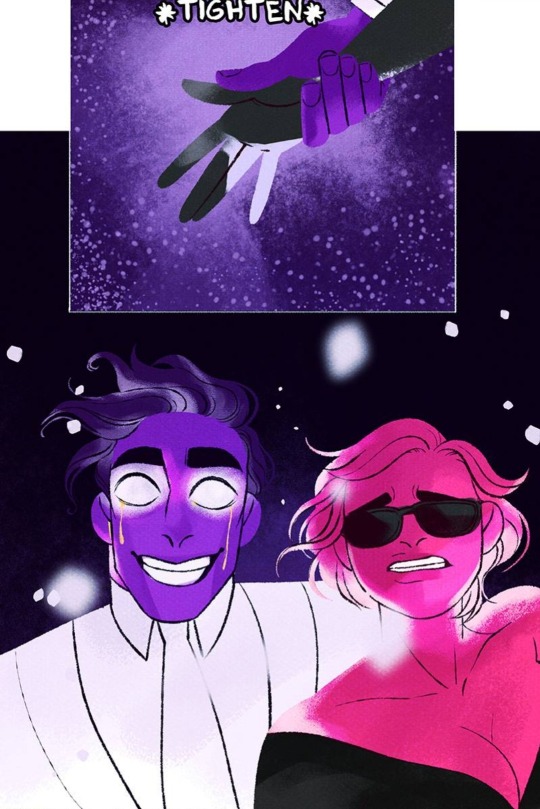
Last week saw Apollo nigh-forcefully working with Persephone to fix the Mortal Realm crisis. With whatever it was Ouranos gave him, it did what it needed to do. At least, for a little bit.
Not only is the bastard clearly and knowingly making the experience miserable for Persephone, but also his plastic smile looks more fake than usual.
Is that ichor leaking out of his eyes? I hope he's in extreme pain from this little show of his. Fucker deserves all the agent he's put others through.

Next, the douche-canoe goes on a shpeal about how Ouranos "helped" Gaia control her powers. She never needed help with her powers. All that Ouranos did was use them for his own gain.
Everything Apollo says about Gaia needing "fixing" is a lie. Further, he blames her marriage to Hades for causing the extreme winter.
He uses it, as predicted, to lead into ordering Persephone to marry him. That gets him numerous ABSOLUTELY NOTs from across the board.

I can't even begin to imagine how horrifying this is for Persephone. This purple Olympian shit stain is desperate to get at her powers. He thinks he's king and can bully everyone just because Zeus is out cold and he's king's son.
I do wish Artemis would show up at some point. Technically, she's got just as much claim to the thrown as her brother, plus the benefit of common sense and decency.

THE QUEEN SPEAKS!
Welcome to the latest shit-show, Hera! She comes out spouting just about everything the other Olympians and the readers have been thinking and feeling.
I particularly love her emphasis that Persephone "so obviously despises" Apollo.

Oh, this was the cherry & icing on the cake!
With the camera still rolling, she outs Apollo for manipulating Hebe into running away. With her piece spoken, she moves onto the next matter at hand.
DAT EPIC MIC DROP THO!!!!!!

Hera intends to fix several things at once by doing what is possibly the most dangerous thing.
Kronos has stated that he won't cooperate unless he's given his "Golden Traitor" back. Hera knows it's dangerous. Her vision from a few chapters back showed her likely getting either killed or completely wrecked in a direct confrontation with Kronos.
And yet, she's willing to take that risk, not just for herself, but others as well. Persephone has been kind to her in multiple ways; the least she can do is give something back.
Maybe they'll save Hades. Maybe they'll save Melinöe. Maybe they'll kick Kronos' ass. Maybe they'll get Persephone's spring powers back. Maybe they'll even find the cure for Zeus. There's so much that can come out of this that the extreme danger feels worth the risk.
We shall see.
BONUS:
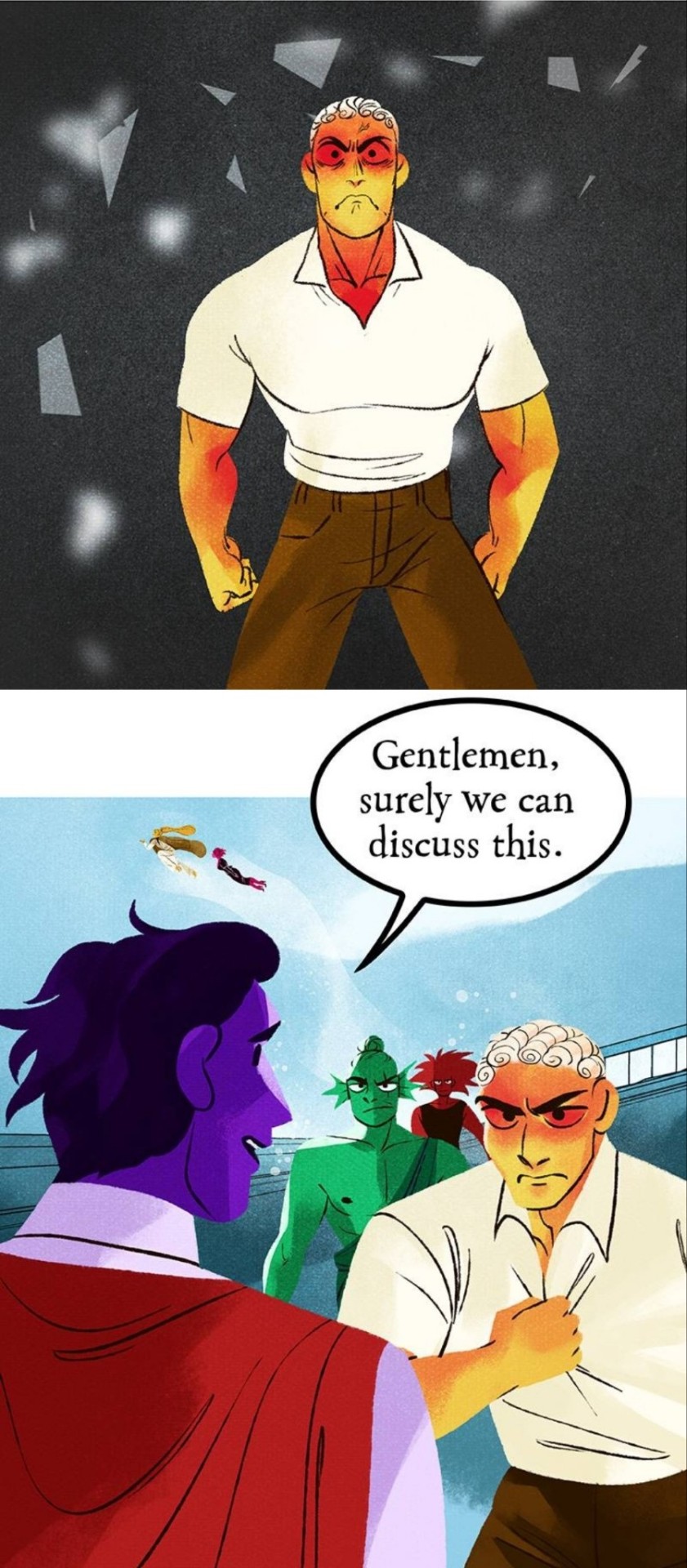
ARES VS APOLLO (with everyone else now), ROUND 2!
FUCK HIM UP, ARES! I WANNA SEE A LOT MORE ICHOR ON HIS UGLY FACE NEXT WEEK!
ANYWAY, THANKS FOR COMING TO MY LO POST!!!!!!!
27 notes
·
View notes
Note
What are you main thoughts on arc v and what you like and don’t like about it?
*Cries out in agony*
Okay fine I'll talk about Arc V.
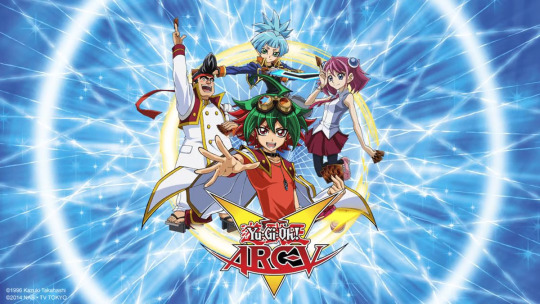
So... I don't know/remember if this has necessarily been a trend on Tumblr the way it has been in my Discord circles but uh... I have a habit of referring to Arc V as my least favourite Yugioh series.
Now let me clarify. By "least favourite" I do not and never have meant "worst". I have stated before that I love every current Yugioh series and believe they all have entertainment value.
Arc V is not a bad series. It has a lot of genuine merit that I would be remiss not to talk about.
That being said, my overview is going to be critical so don't like? Don't read.
1 The duels, even if they were starting to get a little too complicated by this point, are very fun and breathe life into match ups I otherwise wouldn't care for. Looking at the Arc V duels purely based on the cards and plays, I'd say they're a step up from the overly boss monster reliant but otherwise decent Zexal duels and leagues above the slog-fest overly complicated combo ridden duels of VRAINS.
2 The first season of this show is legitimately fantastic. It has some occasional whatever filler episodes here and there but overall it sets up the characters and story really well and is just fun and engaging to watch in general.
3 The way this series depicts the horrors of war, and how it's not necessarily a black and white issue. Arc V takes a more nuanced approach to this and shows characters being groomed or brainwashed into the cause on both sides, not just the fusion dimension. Serena, Sora, Dennis, Reira, even Yuri to an extent that the show didn't show too well- they're all just children forced to fight in a horrible war and Serena, Sora, and Dennis in particular have really interesting arcs and such fun personalities that they are among my favourites in the show.
4 The foreshadowing and ultimate payoff of certain elements is really satisfying and on my first viewing, eclipsed a lot of the problems Arc V had. The show truly does feel grand and epic and the ultimate reveal of the backstory, Zarc and Ray's stories, how the dimensions split, all of that is really well done and interesting and definitely the most interesting parts of the show on rewatches. But... speaking of rewatches...
I'll admit, I really loved Arc V when I first saw it and declared it my second favorite Yugioh series at the time, beating out Zexal and DM but not GX. It was when I rewatched Arc V that the cracks showed and... my god were they big cracks.
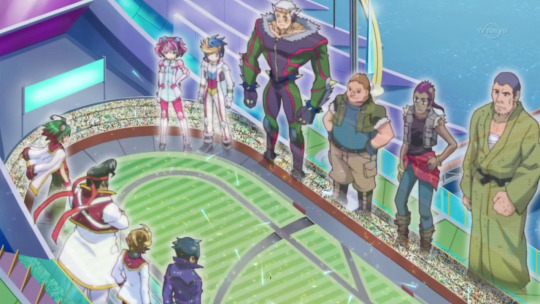
Rewatching the Synchro dimension arc after finally watching and liking 5Ds made me notice how much of the unique riding/turbo dueling elements were taken out in favor of just regular dueling on motorcycles with the occasional action card. But that's a small issue compared to how terrible the social commentary aspects were in the Synchro arc, even without comparing it to 5Ds.
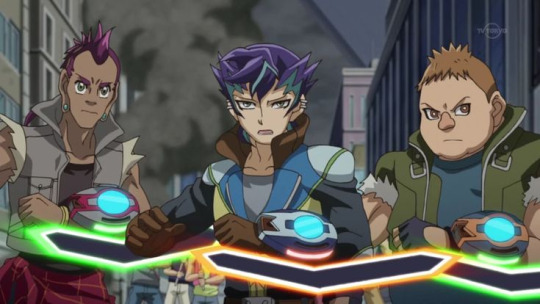
Oh Shinji how they dropped the ball with you.
I'll try to keep this brief but I think the fact that the Synchro arc demonized protesters is incredibly disgusting. And sure, you can claim that the protesters weren't demonized specifically for rioting but for wanting to oppress the rich but you know what? Making all of the protesters, who had very valid reasons to protest by the way, out to just be trying to oppress the rich is still disgusting and I hate it. The way the narrative presents it, it really feels to me like this arc ends with Yuya ultimately forcing his "never fight, only pacifism" beliefs onto LEGITIMATELY OPPRESSED PEOPLE WHO WERE FIGHTING FOR THEIR RIGHTS only to be told "no no no, just talk to your oppressors instead!" which historically, DOES NOT WORK and is a disgusting message to perpetuate, even if it wasn't what the show intended. And this Yuya problem of forcing his ideals onto others along with his character development going in circles are things that do not go away after this. It's a problem with the entire show after the first season and the reason I don't really like canon Yuya very much.
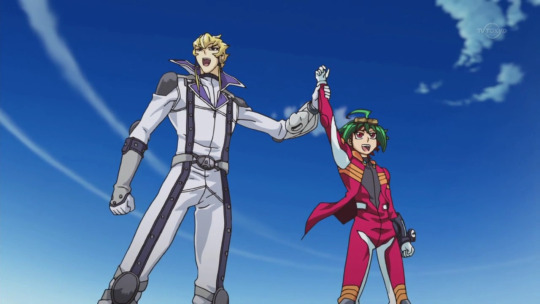
All of this, and also Yuzu's character being destroyed, kills that part of the Synchro arc for me, which is a HUGE part, and the fact that very little actually happens to progress the overall plot for this entire THIRD OF THE SHOW is really frustrating. There's some character development here and there, some arcs being less useless than others, but in terms of major events for the overall story, it really feels like the plot just comes to a screeching halt for most of this arc, with the only things that happen being Serena and Yuzu getting kidnapped, Dennis's betrayal, and Sora's honestly kinda rushed but still decent redemption. So nearly an entire third of the show is both a boring or enraging slog AND doesn't further the overall story I was actually interested in. GREAT.
Also I hate Roget. I don't have any deeper analysis there, I just hate his guts and not in a fun love to hate villain way like Amon from GX. I just hate him and wish he wasn't in this show.
So... the first third of Arc V is great and the second third throws a lot of what made that first third great into the garbage and is so frustrating that I've declared it my most hated Yugioh arc in all eight shows so far. So... where does that leave the final third that most people seem to hate?
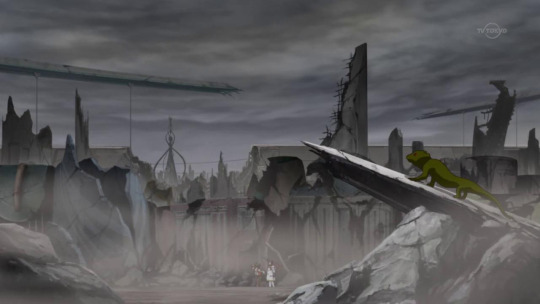
...to be honest, I'm in a weird middle ground where I find this final section of Arc V to be both underrated and also not very good. It's... a mixed bag. I have a lot of the same problems with it that most do: the way the show dropped the ball with Reira's arc, Leo Akaba getting off scott-free for being a war-mongering genocidal maniac, the non Yuya and Yuzu yu-boys and bracelet girls becoming irrelevant the way they were by the end, Rin and Ruri getting pretty much nothing but macguffin status, the creepy mind control shit in general, the Battle Beast arc. Just. The stupid ass Battle Beast arc.
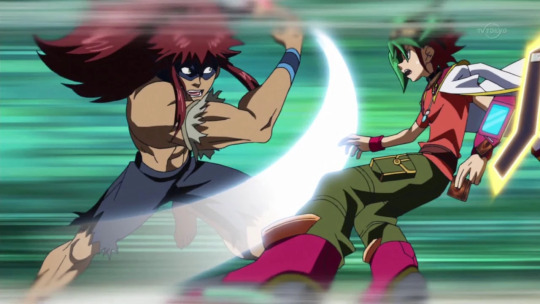
Fuck this arc.
And I have some problems that I feel might be unique to me but are major all the same: the legacy characters, especially Asuka and Edo, being poorly written with Asuka overshadowing Yuzu then being sidelined and treated horribly in her duel with Yuri (still one of my most hated duels in the entire franchise) and Edo being incredibly inaccurate to and disingenuous of his character in GX with his arc being incredibly rushed and also feeding into that Yuya problem of insisting "pacifism will resolve everything!" that I mentioned earlier which also logically should not have worked on this version Edo.
Basically, I DESPISE these duels:
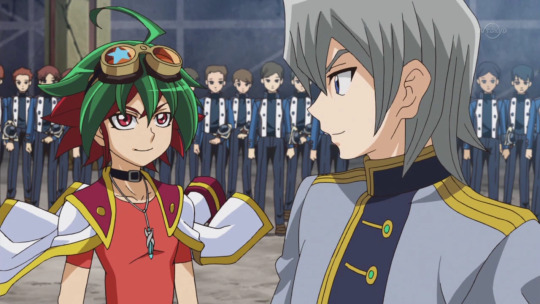
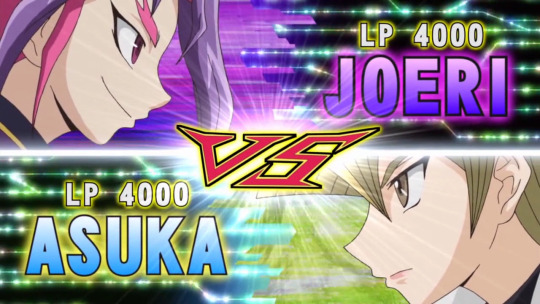
And on top of all of that, I don't like the Z-Arc duel. It's got some funny moments in the dub and I like the concept of it but it just goes on for way too long. For how many characters butt into this thing and how obvious it is that none of them are gonna win until Reira steps up (shouldn't have been her, should've been the bracelet girls or actually Ray in some form) it goes on for so damn long and it's just not fun. I feel no desire to rewatch this thing.
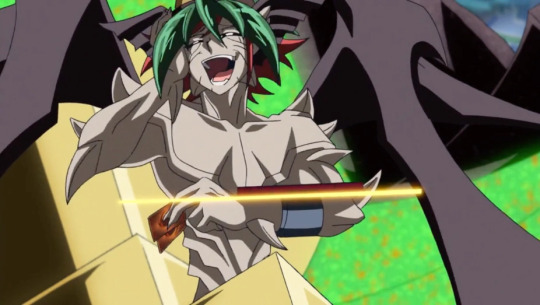
Soooo why did I say this arc was a mixed bag when I've had so many negative things to say about it? Honestly, it's just a lot more fun to watch than Synchro arc was. There's more variety in locations, it's not a tournament so the match ups are more surprising and varied, and like I said earlier, the pay off to all the foreshadowing, mostly from the first arc, is really strong. The grander story is back in focus and there are more good character moments sprinkled throughout than there were in Synchro arc. I don't care for Kaito that much in Arc V, or even Zexal II for that matter, but his duels are still fun to watch, I particularly enjoy his duel with Dennis, if just for Dennis.
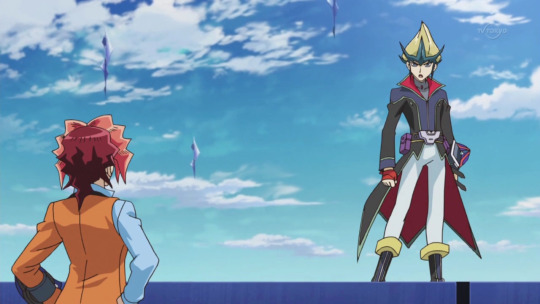
And while I don't like how overly long the Z-Arc duel is, I still enjoy parts of it and the build up to it is genuinely fantastic. Nearly everything that happens from the Z-Arc backstory up through Yuri vs Yuya and all the duels in between are quite possibly the peak of the entire show. Declan standing up to his shitty father and reinforcing his loyalty to and belief in Yuya is amazing and exactly what Revolver's arc in VRAINS should've been, I love Declan and Riley's duel, Yuri gets to be a fun villain for a while before getting discarded, it's all really great stuff. Maybe it's partially my Declan bias, I really love him, he's my favourite character in the show, but these duels are peak.

Also, apart from the stupid aspects of the ending that I already discussed, the last eight episodes are just. Genuinely good in my eyes? People say they bring the plot to a screeching halt but to me, those episodes are an epilogue, and a pretty good one for the characters the show kept around. I unequivocally like the way Dennis's arc wraps up. I like Shun's duel with Yuya. Shun having to accept his sister and best friend are gone but finding happiness in knowing they do still live on in a way is pretty much the only good thing to come out of forcefully fusing the Yu-boys and bracelet girls. Also Jack and Yuya having a goddamn interdimensional turbo duel is still one of the coolest concepts for a duel EVER. And Declan vs Yuya right after it is a really fun duel with a very good emotional core. Still absolutely LOVE that moment of Yuya understanding and sympathizing with Z-Arc. All these parts are a great way to wrap up the series, even if a lot of the stuff around it isn't.
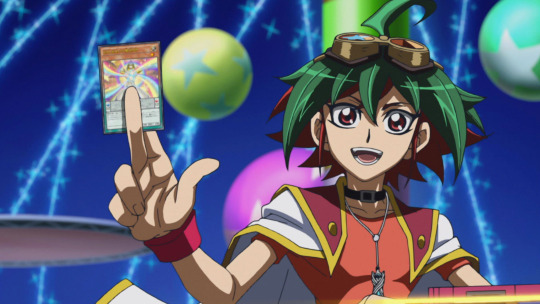
It's definitely an arc, and show for that matter, of peaks and valleys and sadly, a lot of those valleys really aren't worth trudging through to get to the peaks for me. Arc V, to a more major extent than 5Ds, is the kind of show that I don't feel compelled rewatch in its entirety, just the parts I really like (or need to rewatch for writing reasons or something).
So overall I do like Arc V but it is the Yugioh series I have the most problems with.
#yugioh#ygo#yugioh arc v#ygo arc v#arc v#wrote this instead of watching the new Go Rush live#because the dang stream wasn't working again :(
11 notes
·
View notes
Text
some Thoughts about the 02 show (while the days of ltwt show recaps the length of essays are gone, I thought I'd share some stuff)(this of course got kinda long anyways, I am nothing but predictable!)
first of all it's so interesting to go online after a show and "consume" the show through different perspectives... I was in the pit close to the sound booth and could see a tiny Louis like tunnel vision (and not even always - I had to look at the screens a lot more than any previous shows). I had never been to such a big venue and it felt like the arenas I'd be previously - it's so hard to gage. Anyways when I saw Louis' IG post I realized how far I was and seeing pictures and videos of the venue - I truly hadn't realized the sheer number of people. Also the lights project from our POV seemed to have bombed but seeing the videos, it did create the intended effect. Also I was so far that I had to ask the gc for the color of the pants (#purple #slay) and only in the encore, when there was a camera on Louis' entire body, did I notice the shoes (unfortunately my eyes deceived me into thinking they were Nike). I missed all the little quirky faces and interactions that I now see in gifs. HOWEVER I did not miss the several times Louis teared up including during Chicago and during his speeches and I tell you my heart was bursting. I love that he talked a bit more than usual - I think he said something like "I can't put into words... well let me try" and he said everything so perfectly! The reference to his dreams and the "we" - I just listened to him and thought how much I love him. His special thanks to his band was super sweet.
setlist: HOTH safe! If I hadn't known DMD was back on the setlist I wouldn't have recognized it. No 7 :( I tolerate Angels Fly but tbh I don't understand how it's there and not like Headline or Always You or FEARLESS. High in Cali was hilarious because you could tell weed isn't legal in the UK lmao - the vibe was so different than back home. 505 still so good and now I can sing every single lyrics but in a very oh poor me, the show ruined my 5 x 505 streak this year since it's now 6. But 505 Laval you'll always be #1 in my Heart <3. We Made It is still the It Girl and Silver Tongues... I doubt a closer will ever come this close (hehe) to how fucking epic it is. Tbh I could hardly tell when the string section was playing but I'm glad I had a show with strings! Me still in LTWT mode wondering why the pyro didn't go off during Walls only to be told there hasn't been any for this tour ouuuups. The Megamix SLAYS so hard and the special effects were SO cool! I did miss the classic rainbow lights for SIBWAWC cuz the lasers didn't reflect on the crowd as nicely but the clouds and at the beginning of ATT were beautiful.
Talking about lasers I was eyeing this guy in the soundbooth that I'd never see before and was clowning about him being there for the LIVE ALBUM RECORDING. I even took notes to figure out later where he works (spare a thought for tumblr user bbrox who has to put up with my insanity). ONLY to figure out 1 hour later that the guy was the special lasers guy as made so obvious by the fact he packed up his stuff after Saturdays in a box that said "laser fx triangle C" lololol. Sometimes I think it's good to clown for nothing - be humbled!
I saw most of the crew in the soundbooth - the person I was with was trying to spot the Tomlinsons while I was looking for Oli and K and was mentally putting a check on names for the sound and lights guys - priorities! (Blaming Red Rocks for having us go down the rabbit hole of every single member of the crew)
Oh yeah the KMM lights! It was kinda spontaneous? He had a little shy smile like he was telling himself 'look at this lot' and it was soooo adorable. I'm glad I got to be a part of it <3 Which pretty much summarizes this whole show - witnessing a moment in history.
Finally - TANK TOP LOUIS WITH MY OWN 2 EYES!!!!!! And what a tank top!!! #blessed #cantspellslutwithoutlt
Everyone's been saying being a louie is for life and that just keep getting stronger and stronger everytime I get to see him perform! Can't wait for future shows!!!
39 notes
·
View notes